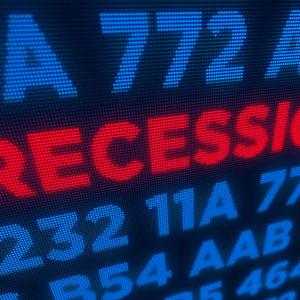Economic policymakers are often advised that they should hope for the best and prepare for the worst. As the global economy now shows every sign of slowing down, that advice would seem to be particularly timely.
This is especially the case considering that there is good reason to believe that the next U.S. and global economic recession will be more severe than has been the average post-war economic recession. It is also the case considering that the world’s central banks are running out of monetary policy ammunition to combat another recession.
There can be little doubt that the world economy has recently taken a meaningful turn for the worse. As the IMF has noted, over the past year the world economy has gone from a situation of a synchronized economic upswing to one of a synchronized economic slowdown. It has done so largely as a result of escalating global trade tensions.
China, the world’s second largest economy, is now growing at the slowest rate in more than a decade. Germany, Italy and the United Kingdom are all on the cusp of economic recessions. Even the United States, still the world’s largest economy, has slowed to stall speed.
Sadly, at a time that the global economy is already showing signs of fragility, it is confronted with a number of major risks that have an uncomfortably high probability of occurring and that could tip the U.S. and world economies into meaningful recessions.
Among the more troubling of these risks is the chance that there might be an escalation in the U.S.-China trade war or that President Trump might follow through on his threat to impose a 25 percent import tariff on European and Japanese automobiles by year-end.
Factors that could lead to an escalation in the U.S.-China trade war include China’s possible use of military force in Hong Kong or its possible decision to take a hard line in the trade negotiations with a view to waiting out the Trump presidency.
Meanwhile, any further depreciation in the euro in response to a weakening European economy could heighten Trump’s charges that the Europeans are deliberately weakening their currency for competitive advantage thereby justifying his case for additional U.S. import tariffs.
Another major risk confronting the global economy is the risk that over the next few months the United Kingdom might crash out of Europe without a deal. The chances of that occurring have increased since Boris Johnson has become prime minister. According to the Bank of England, a hard Brexit could see at least a 5 percent drop in U.K. output relative to where it might otherwise have been. That would seem to be the last thing that a European economy on the cusp of a recession now needs.
Should any of these risks materialize, they would be occurring at a time of considerable global financial market fragility. As a result of a decade of ultra-unorthodox monetary policies by the world’s major central banks, the world is now drowning in debt, bubbles have formed in a number of important housing markets, equity market valuations have become increasingly stretched, and there has been a major amount of credit misallocation. Such a combination of factors raises the real risk that any economic recession would be amplified by the financial market dislocation that a recession would trigger.
Global economic policymakers must know that, with world interest rates as low as they currently are and with their balance sheets already bloated with government bonds, the world’s central banks have limited ammunition to fight the next economic recession. After all, there are limits to how negative interest rates can be allowed to become before they do serious damage to the world’s banking system.
All of this would heighten the need for a consensual approach among governments to de-escalate the world’s trade war. It would also suggest that it is not too early for global economic policymakers to start thinking about how to coordinate a fiscal policy response to the next global economic recession in a manner that would prevent an undue policy burden from being again placed on the world’s central banks.

